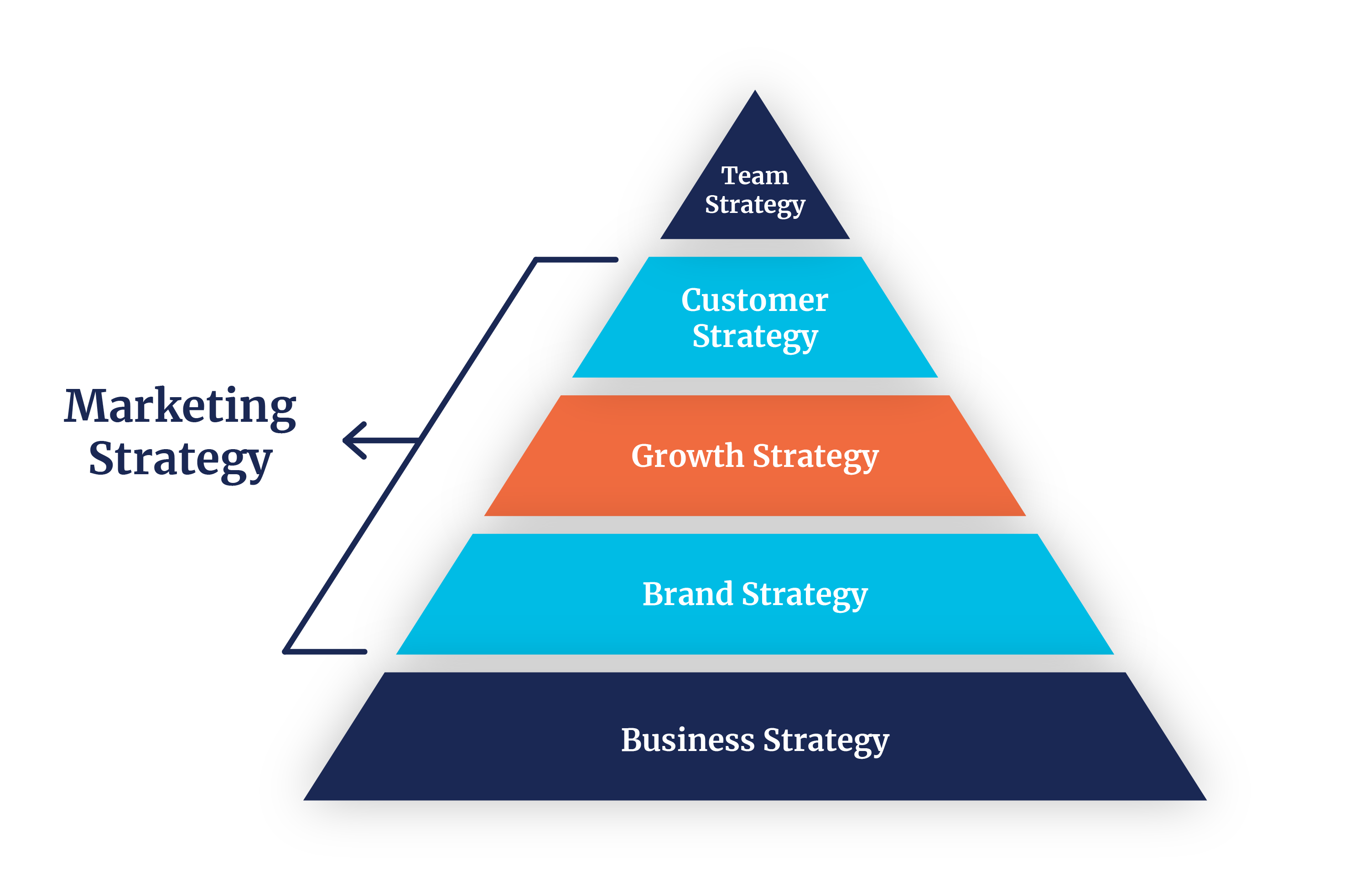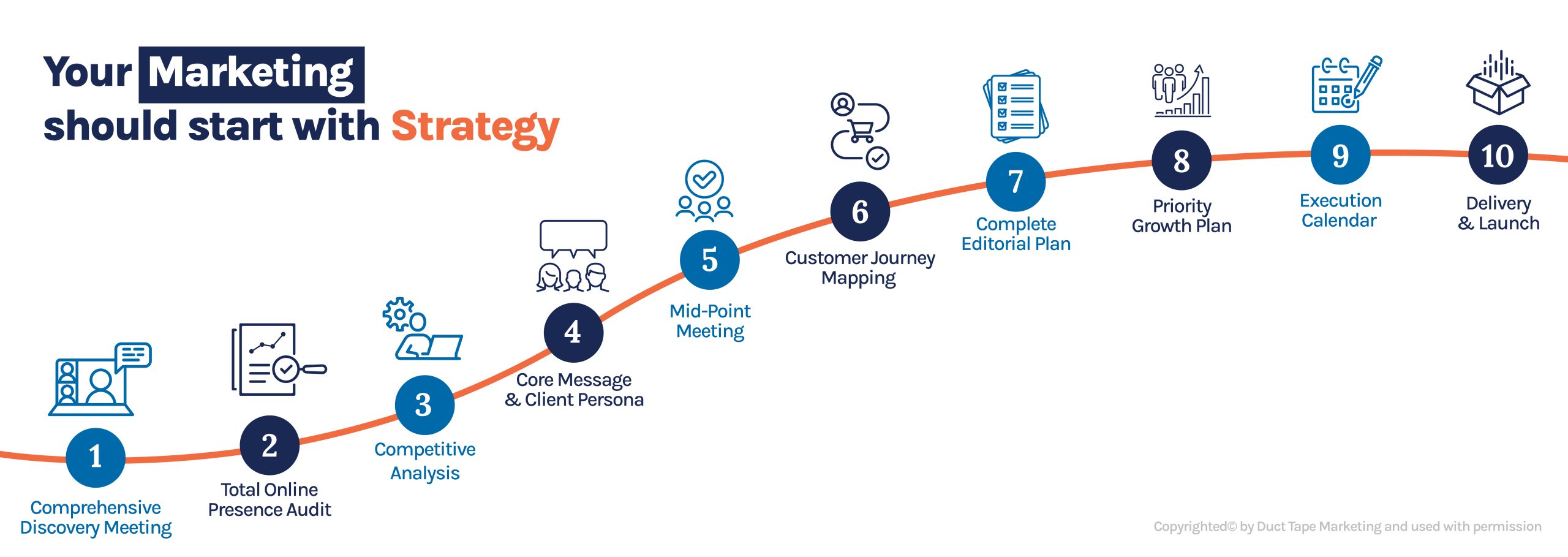Scale Your Business with Precision: A Step-by-Step Guide to Implementing the Marketing Strategy Pyramid written by John Jantsch read more at Duct Tape Marketing
Want to stay ahead of your competition and keep your business growing? A solid marketing strategy and understanding the Marketing Strategy Pyramid are key.
With AI evolving fast, attention spans shrinking, social media algorithms constantly changing, unpredictable ad costs, and tighter privacy rules, it’s easy to get caught up in the latest "quick fixes."
But what your business—or your clients' businesses—really needs is a steady guiding light to stay on track. That’s where the Marketing Strategy Pyramid comes in.
You can catch the podcast episode here if you would rather listen to me talk about the Marketing Strategy Pyramid.
What is Marketing Strategy?
It’s easy to get tangled in the jargon of marketing tactics, but at its core, a marketing strategy is the master plan that sets the direction for how your business will compete and stand out in the marketplace.
For fCMOs and business owners, it's critical to not just know but to master the art of aligning these strategies with broader business objectives.
For businesses, it’s important to prioritize strategic planning over quick fixes. Strategic planning provides the framework to make decisions that enhance long-term sustainability rather than just immediate gains.
If I were to give marketing strategy an emotional definition, it's how you will place the flag in the sand to say, “Here's how we're going to dominate.” But that probably isn’t helpful in understanding how to create a successful marketing strategy. That is why I built the Marketing Strategy Pyramid.
The Marketing Strategy Pyramid
Think of the Marketing Strategy Pyramid as your roadmap for integrating comprehensive strategies with your business’s key goals. The Marketing Strategy Pyramid shows that there is no one magic marketing strategy or marketing tactic. It's really about integration, and that's what we do for clients, something we call Strategy First.
The Marketing Strategy Pyramid has five layers to it, and the middle three layers are really the marketing strategy component and everything rests on the overarching business strategy.

3 Core Components of the Marketing Strategy Pyramid:
- Business Strategy: This is the bedrock that focuses on growth, dominating your market, and retaining clients.
- Marketing Strategy: This layer is the heart of the operation, including brand, growth, and customer strategies.
- Team Strategy: The capstone that ensures your strategies are executed flawlessly by your team.
When we come in to work with a client, the main thing we are there to do is develop the marketing strategy and then the list of tactics to employ that strategy, but everything is based on the overarching business objectives. So if growth is a business objective, if dominance in a market is a business objective if retention of clients is a business objective, then the marketing strategy is built around that and only that to begin with.
Business Strategy
The foundation of all of this is the business strategy, which sets the stage for every tactical decision.
For example, the very first thing we do in working with a client is try to understand where they're going, try to understand the profit that they want to make in this business, try to understand the market share that they want to enjoy before we ever start really suggesting anything.
And unfortunately, very few marketers actually take that approach. Very few business owners actually take that approach. They want to hire a marketer to generate some leads, and that usually leads them to doing a whole bunch of different tactics that they shouldn't be doing and takes them away from focusing on the things that are actually going to allow them to meet their marketing objectives and drive real growth.
Developing a Marketing Strategy
The marketing strategy is the meat of the Marketing Strategy Pyramid and consists of brand, growth, and customer strategies. These three elements reflect the comprehensive journey a customer takes with your business.
At Duct Tape Marketing, we believe this is how a customer or a lead effectively moves through a business. These three elements reflect the marketing journey inside of the marketing strategy.
Often, people end their marketing strategy with a clever tagline, colors, and logos, and they call it a day. But what I want to suggest is a marketing strategy actually runs through the entire customer journey.
We use something called the Marketing Hourglass. It’s a tool we use to reinforce this idea of the customer journey.
The Real Brand Strategy
Brand strategy is where we will help identify who makes an ideal customer, narrow the focus, and define the products and services the customer is looking for.
We also are going to focus a great deal of attention on messaging. Are we promising to solve that ideal customer's biggest problem as opposed to, here's what we sell, so nobody cares what we sell; they want their problems solved.
-
Narrowing Focus: Pinpoint your ideal customer to tailor your marketing efforts directly to them.
-
Defining Offerings: Clarify what you provide that specifically solves your customers' problems.
-
Messaging: Shift the conversation from what you sell to how you solve their biggest headaches.
For example, consider Cedar Ridge Retreat Homes, who came to us facing significant challenges in marketing their luxury home-building services. Their previous marketing efforts failed to resonate, leaving their brand message unclear and poorly aligned with their business objectives.
Through our "Strategy First" process, we pinpointed their ideal customer and crafted a resonant brand identity that emphasized retreat spaces over generic rentals. This strategic pivot not only clarified their offerings but positioned Cedar Ridge for substantial growth in their niche market.
Brand strategy development also includes things like how we want to be perceived. Are we fun? Are we very serious? Are we analytical? This drives all of your content. Lastly, many people put this first, we want to make sure that the names, colors, graphics, logos and things all support the message and the brand promise are aligned. That is all the first part of marketing strategy.

Formulating a Growth Strategy
The second part is the growth strategy. What are the tactics we're going to use to attract, build trust, get people to try and buy from us?
The growth strategy includes all of the communication and content designed to move people through the Marketing Hourglass stages. Certainly, it's advertising and all the things that create awareness. It should also be about building trust and facilitating a seamless buying experience.
By staying attuned to the current landscape, we, as fractional CMOs, can pinpoint the opportunities and challenges that will shape the success of our strategies. For instance, if we observe a rising trend in video content consumption and it aligns with the business strategy, it’s essential to weave video marketing into our growth plans to effectively capture and engage our client’s target audience.
Building a Customer Strategy
After the sale, the real work begins. Your customer strategy should aim to turn first-time buyers into lifelong fans and advocates. This includes:
-
Onboarding: Make their first experience with your brand unforgettable.
-
Customer Engagement: Keep the dialogue going and the relationship growing.
-
Referral Programs: Use satisfied customers to bring in new ones. I wrote an entire book on referrals called “The Referral Engine: Teaching Your Business to Market Itself” that covers this topic extensively.
Our past customers are often our best customers. Did you know 80% of a company's revenue comes from just 20% of its existing customers?
By investing in these customer loyalty strategies, you can build a base of devoted customers who drive sustainable growth for your business.
Implementing a Team Strategy
So their overarching business builds on this business strategy, has marketing strategy in the middle, and the cherry on top is the team strategy.
The team is there for the execution. You build it (business strategy), communicate it (marketing strategy), and execute on it (team strategy).
Team strategy includes:
-
Team Alignment: Ensure everyone is on the same page and fully equipped to deliver.
-
Training and Development: Keep your team sharp and informed with regular training.
-
Culture: Cultivate a team culture that attracts and retains top talent, emphasizing values that elevate both the company and its clients.
As a business owner, the team also allows you to scale efficiently and effectively.
"If you want to go fast, go alone. If you want to go far, go together."
For fCMOs and business owners, a well-crafted marketing strategy is more than a set of tactics. It’s a comprehensive system that threads through every layer of your business. By leveraging a structured approach like the marketing strategy pyramid, you can align your business goals with your marketing efforts to drive real, sustainable growth.
Visit dtm.world/growth for insights and tools to understand your or your clients' marketing strategy and ultimately grow your business.
Navigating this journey isn’t just about knowing what to do; it’s about making strategic moves that make sense for your business.
from Duct Tape Marketing https://ift.tt/0iumNat
via
IFTTT





 work in sync with your team all on one canvas, and reuse templates, widgets, and sections across sites. Create a client kit for seamless handovers and leverage best-in-class SEO defaults across all your Wix sites.
work in sync with your team all on one canvas, and reuse templates, widgets, and sections across sites. Create a client kit for seamless handovers and leverage best-in-class SEO defaults across all your Wix sites. Nobody does data better than Oracle. Train your AI models at twice the speed and less than half of the cost of other clouds. If you want to do more and spend less, take a free test drive at
Nobody does data better than Oracle. Train your AI models at twice the speed and less than half of the cost of other clouds. If you want to do more and spend less, take a free test drive at 